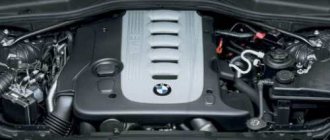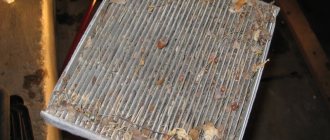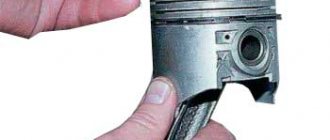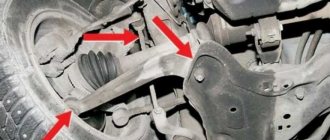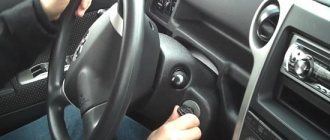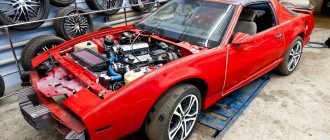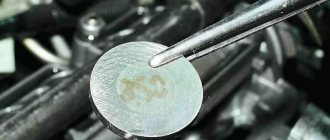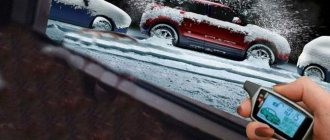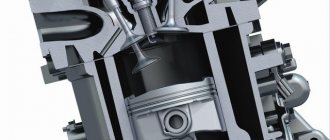The engine can be considered one of the most complex devices in a car. Its uninterrupted operation largely depends on the efficient operation of auxiliary systems. If malfunctions occur in their operation, there is a high probability that the working elements of the engine will be subject to increased wear, which ultimately can cause the breakdown of one or another unit.
Among other things, in the case of long mileage, the engine components may have increased mechanical wear, due to which the normal operation of the internal combustion engine is disrupted and various undesirable symptoms begin to manifest themselves. The most serious of them is a characteristic knocking sound in the engine area. Such a malfunction cannot be ignored.
Any extraneous noise in the operation of the engine should serve as a signal for active action aimed at promptly eliminating the breakdown. Depending on the nature of the phenomenon presented, the reasons for its occurrence may be of a different nature.
Let's try to find out why the engine knocks under different operating modes.
Knocking in the engine when cold: reasons
Any car owner is pleased with the smooth, correct, almost silent operation of the car engine, because this indicates its full serviceability. Therefore, various extraneous sounds that occur in the internal combustion engine area are justifiably alarming, because they are a kind of signal that some problems have arisen that require immediate elimination. One of these signal markers is a knocking sound in the engine when starting from a cold state.
What should a driver do if a knock occurs?
It is difficult to answer this question unambiguously. Of course, if a knocking noise appears in the engine area, you must immediately contact specialists to carry out a complete diagnosis.
However, if the reason for the noise is such trivial reasons as an unscrewed crankcase or flywheel mudguard, it is quite advisable to do it yourself.
On the subject: How to connect a Pioneer radio according to the diagram and wire colors
Thus, in order to eliminate the problem of knocking in the engine, it is important to learn to recognize its nature, and, based on the information received, draw appropriate conclusions about the further resolution of the current situation.
Determining the causes of sound
Modern cars are equipped with engines in which the clearance is adjusted automatically. When looking for an answer to the question why a valve is knocking on a foreign car, the answer is most likely not in adjusting the clearance. All modern internal combustion engines are equipped with hydraulic compensators. But with domestic cars and other foreign cars that do not have a similar system, the issue of adjusting the gap is relevant. On many foreign cars, the procedure for adjusting or checking the clearance is a complex topic. As a rule, the engine should be checked for violations of the gap by specialists. On an old engine or domestic units, you can check why the valves are knocking as follows:
Other causes can only be identified through a professional inspection of the engine, or in some cases, during its disassembly.
Causes of engine knocking
Element
Causes
If you still don’t understand what to do if the engine knocks , have the mechanism checked at a service station and identify all the problems. The scope of services and the final cost of repairs depend on the correct detection of the noise source. Check the price of the work by calling the specified service station phone numbers.
Is it correct to independently determine the source of the knock?
Even an experienced driver can misinterpret knocking noises coming from the engine, since not every car enthusiast has encountered repairs to this unit. Any bearing, bearing or other element can produce sounds that will be interpreted in different ways. If the oil has been changed a long time ago, and fuel is used only from trusted brands, then the only thing you need to pay attention to is the intensity. Increasing knocking sounds indicate not the most pleasant reasons, which only professionals can eliminate.
However, looking for a source yourself is still the right decision, since in most car services workers are not in the habit of doing cheap and long work. The easiest way to answer the client is that only an expensive “capital” will help, but this is not always true, because sometimes it’s enough just to change the oil.
Engine repair tips
If a distinct knocking sound appears in the engine, be sure to check the engine oil level; its drop in the lubrication system can lead to malfunction of the entire internal combustion engine system. If the level is optimal, determine where the sound is located. At this stage, you need to make sure that the following are in working order:
- fuel system;
- drives;
- attachment pulleys.
The next step is to determine the characteristics of the knock. If a “loaded” engine knocks more strongly, most likely, problems have appeared in the crank mechanism or in the cylinder-piston group.
If you notice that the knocking frequency does not coincide with the crankshaft rotation speed (it differs by about 2 times), then the probable problem must be looked for in the timing system. The fact is that the crankshaft rotation speed is 2 times higher than the camshaft rotation speed. When the engine warms up, the knocking noise usually gets worse because the clearances in the valve mechanism become larger as the engine heats up. The gas distribution mechanism, on the contrary, is not related to the operating mode of the engine. As an exception, we can recall cases of hydraulic compensators knocking under load.
Increased knocking can also occur due to heating and subsequent expansion of the engine oil, which indicates a problem with the bearings of the crankshaft mechanism.
The specialists of the official FAVORIT MOTORS service center will help you troubleshoot any engine design. The experience and professional knowledge of our specialists can quickly and inexpensively return your vehicle to good condition using original spare parts, consumables and modern equipment. All work is carried out with a guarantee and in accordance with the manufacturers' recommendations.
Whistling like the Nightingale the Robber
Some cars can frighten their owner with a sudden and strong whistle when starting to drive. The car warmed up calmly and without unnecessary sounds, but as soon as we started driving, it began to whistle all over the street. The reason most likely lies in the tension roller of the drive belt. Domestic cars especially often suffer from this disease. If you notice this behavior in your car, then you should not turn a blind eye to it, as many do. This unfortunate roller can jam at any time and cause the belt to break, which will lead to the pistons meeting the valves.
Photos from Internet resources
Why is the engine knocking?
There can be many possible reasons for engine knocking. In the list of the main ones, experts note wear of parts inside the internal combustion engine, as well as detonation knocks. The degree of wear and a number of other factors will determine the nature of the knock, which can be from quiet and muffled to distinct metallic knocks inside the engine. After the engine starts when cold, a knocking noise in the engine becomes audible, which, when warmed up, can:
- disappear completely;
- become less noticeable;
- stay at the same level;
- increase with increasing temperature and load;
Why does the engine knock?
Noise in the operation of the motor signals the presence of a deviation in the operation of a particular unit. In this case, you should not immediately condemn the internal combustion engine and prepare for its capitalization or replacement.
First of all, it is necessary to find out what exactly in the engine is responsible for the appearance of this symptom. You need to pay attention to which part of the engine compartment the noise is most intense.
In addition, it is also important to take into account the conditions under which this phenomenon manifests itself most clearly. Let's consider a number of reasons for knocking during engine operation, which are included in the list of the most common.
- detonation phenomena in the operation of internal combustion engines;
- increased wear of components;
- mechanical damage to elements.
The first reason most often occurs when low-quality fuel is used. The fact is that in the vast expanses of our vast Motherland there are many charlotans who, under the guise of 92 or 95 gasoline, “sell” cheap low-octane fuel, which is less resistant to detonation.
This phenomenon often occurs when the car is operated for a long time at low speeds. Such “careful” driving can play a bad joke on the car enthusiast. The fact is that in this case, carbon deposits form on the walls of the pistons and combustion chamber, which can cause detonation processes.
The second, no less common reason for the appearance of noise in the internal combustion engine area is directly related to the wear of key components and elements. In most cases we are talking about motor bearings.
Thus, the occurrence of increased gaps in the contact areas of the rubbing surfaces of the crankshaft and camshaft has a negative impact on the uniform operation of the entire power unit.
It is worth noting that the presence of an oil pressure warning lamp in this case can serve a good purpose. If there is increased wear of the crankshaft liners, as a rule, this leads to a decrease in pressure in the oil line, which is indicated by the indicated lamp.
Among other things, a characteristic noise can also be produced by an elongated timing chain. To solve the problem, it will be enough to tighten it in strict accordance with the manual.
Various types of mechanical damage to engine elements should not be discounted. It happens that a banal misalignment of the crankshaft pulleys and the pump can cause knocking noises.
Practice shows that the described phenomenon can also be encountered in the event of deformation of the protective mudguard of the engine crankcase or flywheel.
Starter operating principles
A starter is an electric motor whose main task is to spin the engine so that it starts working on its own. To do this, a special control device is installed on the starter - a solenoid relay. But after starting the engine, the rapid rotation of the flywheel can destroy the starter mechanism, so a special overrunning clutch called a bendix is installed on it. The starter operates in several stages:
- After turning the key to the start position, voltage is applied to the solenoid relay. Its coil is magnetized and attracts the core, which moves.
- The fork, attached to the core, moves the bendix with the gear to the gear or flywheel ring, and at the end of its stroke it closes the contacts to the starter motor.
- Current is supplied to the armature, it begins to rotate in the magnetic field of the stator, simultaneously rotating the overrunning clutch, flywheel and crankshaft.
- After the engine starts, the key turns to the operating position and the current stops flowing to the solenoid relay. Under the influence of the spring, it returns to its original position, returning the bendix to its place and opening the contacts to the electric motor, as a result of which the starter stops working.
to “Why does the engine knock when it’s hot and when it’s cold.”
I do not agree with the author. Hitting the road with a knocking engine is absurd, unless we are talking about valve knocking, which you can adjust yourself. A knock in the engine is a sign for the driver. In most cases, this indicates a serious engine malfunction. In any case, the motor must be disassembled to fix the problem. True, there were cases when a car owner filled in bad oil and the engine began to knock. The issue was resolved by replacing it with high-quality oil and the client left happy that he had avoided major engine repairs. A knocking noise may occur due to a clogged oil receiver. This occurs after flushing the lubrication system with solvents. Resins and dirt after this procedure settle in the pan and clog the oil receiver. At high speeds the knocking does not appear - the oil pressure is enough to lubricate the parts, but at idle the engine begins to knock as the oil pressure drops. The problem can be easily solved. The pan is removed and the oil receiver is washed.
A number of other reasons
Other components that have not yet been described can also cause knocking. This list includes:
- Fuel pump drive. You will hear a loud knocking sound similar to the sound from the valves.
- Connecting rods knocking due to worn bearings. By turning off the cylinders one by one, you can diagnose the problem.
- Incorrect cylinder block gasket dimensions. It protrudes into the combustion chamber, where it is touched by the cylinder. Characterized by a dull sound.
- Plunger pairs. They can make noise in diesel units. Not critical.
The complexity of the motor design makes diagnosis and repair a complex process. The best option is a trip to a specialized technical center. As a rule, such workshops have all the necessary equipment that will help identify the cause of the knocking. If the car has an electronic control unit, you can additionally perform computer diagnostics.
When starting from cold
If a knocking noise starts when you start the engine at a cold temperature, this is due to the viscosity of the oil on a cold engine, especially for this reason the noise of the expansion joints occurs.
If the driver changed the oil, he heard knocking noises in the engine when starting up. This is a normal phenomenon, since the oil was drained during replacement, and the new oil has not yet had time to completely enter the lubrication system. For some time the engine runs with oil starvation, as a result. To speed up the oil filling process, all engine lubrication systems are filled with oil before changing a new oil filter.
When the oil level in the crankcase decreases, an incomprehensible noise also appears in the engine, gradually increasing as it warms up below. When hot, it intensifies with increasing speed and these are signs of oil starvation of the connecting rods and piston pins.
No mechanical contact between gears
If the starter knocks when you turn on the ignition system and the solenoid relay works normally, but the engine does not start, then this problem is mechanical, and its reason is that the gear on the freewheel does not fit into the flywheel crown due to nicks formed on it teeth.
When moving forward, the bendix stops on these nicks, while the contact pins do not close the starter motor. As a result, after turning the key, only clicks are heard when the retractor is activated and dull blows when the flywheel and bendix gears collide.
A characteristic feature of this breakdown is that it manifests itself periodically; after the problem occurs, the car starts up normally again for some time. This comes from the relative position of the flywheel crown with the clogged areas. If they are opposite the teeth of the Bendix gear, the starter does not turn the crankshaft, and one defective tooth is enough for this. In all other cases there will be no problems with starting the engine.
To solve the problem when the starter rattles without engaging the flywheel, you need to turn the crankshaft a little. To do this, you need to turn off the ignition, set the gearbox to fourth gear, and then push the car. The crankshaft will rotate to the desired angle, and the car can be started. For large cars, it is better to jack up one of the drive wheels and turn it along with the crankshaft.
If the engine starts after turning the crankshaft, it is necessary to inspect the ring for defects. On many engines this can be done without removing the starter itself. To do this, remove the plug on the clutch housing and slide off the rubber cover on the clutch lever. We install the compact flashlight so that you can see the connector that opens after sliding the rubber cover.
We install a small mirror so that the teeth of the flywheel crown are visible. Through the hole from which the plug was removed, you can turn this gear using a screwdriver. At the same time, the teeth are carefully examined to see if they are deformed. If such a defect is identified, it will need to be eliminated. This is best done at a specially equipped station.
It should be noted that contacting an auto electrician or auto diagnostician for such a breakdown is simply a waste of money. If no grooves or other damage is found on the crown of faces, the problem lies in the starter itself.
